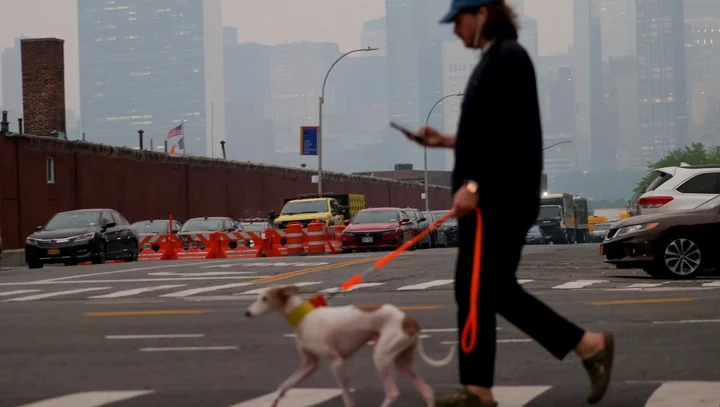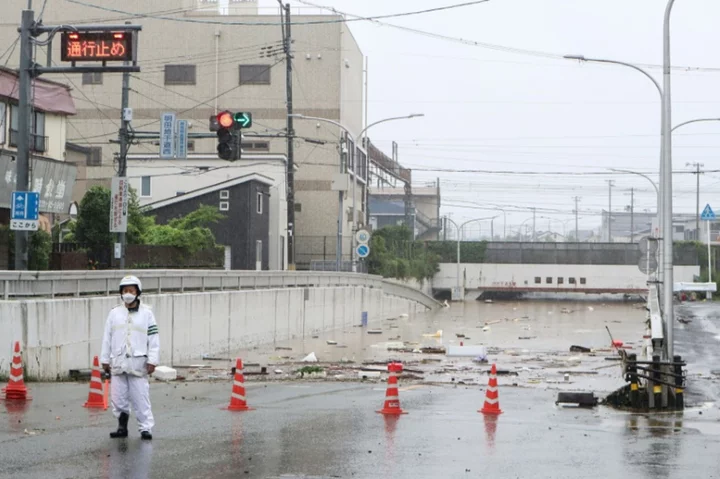The U.S. Northeast is currently smothered in smoke, as Canadian wildfires rage in what may be its worst fire year yet. This has sent air quality plummeting, with residents donning N95 masks and staying indoors in order to reduce how much of the dangerous smoke they're inhaling. But what about protecting our furry friends?
Just like most humans, most pets have lungs. And just like us, animals getting dust in their respiratory system is not great for their health. Dogs, cats, and other animal companions may not understand the danger that smoke can cause, but that doesn't mean it can't harm them.
SEE ALSO: How to protect yourself from Canada wildfire smokeFortunately, many of the same precautions we take to protect ourselves can also protect our furry friends. Keeping all your windows closed, laying moist towels in gaps under doors to the outside, and running an air purifier will all benefit any animals that live with you.
However, there are also a few other pet-specific tips that can help keep them safe during this time. Here are some ways to protect your pets while waiting for the smoke to clear.
1. Keep your pets indoors
It may be obvious but it's still worth reiterating: Keep your pets indoors. Nobody, whether human or animal, should be outside in this smoke if there is any other alternative. Your dog may be an outdoor pet, but you can make an exception when being outside becomes a health hazard.
This includes feeding your pets indoors, as well as keeping their food inside. Leaving bowls of food and water outside provides the opportunity for ash to settle on it, which is harmful to pets when ingested. Also remember to clean and refill your pets' bowls daily to minimise the danger of them consuming ash.
Featured Video For You Canada wildfires turn New York into the world's most polluted cityYour pet might still need to go outdoors when nature calls, but make sure these bathroom breaks are as short as possible. Exercise should further be kept to the minimum so that your pet isn't aggressively inhaling smoke, and conducted indoors where manageable.
Of course, not all pets can be physically moved indoors. If you have a fish pond you can't bring inside, cover it to protect it from soot as best you can. Covering your birds' cages with a damp cloth will also help to protect them from smoke — though be sure not to saturate it completely, as that will hinder airflow.
2. Clean your pets
Furry pets tend to clean themselves by licking up whatever detritus sticks to them, treating themselves like a big furry lollipop. Usually this consists of dust and poop, which may be gross but is typically harmless. Unfortunately, ash and soot can also cling to their fur in smoky conditions, lying in wait for them to unwittingly ingest.
Brushing your pet regularly will help dislodge these particles, as will washing them as normal with a pet-friendly shampoo. Cleaning their feet after letting them outside to do their business is also beneficial, as they may have walked through ash they will later lick up.
They'll probably hate it, but it's for their own good. Credit: Getty ImagesEven if your particular variety of pet doesn't lick themselves, being dusted with ash still isn't typically good for their health and wellbeing. Offer them the means to bathe themselves, such as a birdbath full of clean water.
3. Get your pet an N95 mask
If you're really worried and want to go that extra mile, there are N95 masks available for dogs. The K9 Mask is a reusable mask with disposable filter inserts, while Amazon also has single-use masks that are designed for dogs.
Masks such as these may offer you some peace of mind — after all, if we're all wearing masks due to air pollution, why shouldn't our pets? Still, remember to consider how tolerant your pet is of having things on their snout, and maybe just try one before you decide to stock up. They probably won't be a fan when you first put it on them, but if it causes them prolonged distress then you might be better off forgoing the mask.
Alternatively, if you have a cage animal, a cat, or smaller dog and really want to splash out, a pet respiratory chamber is also an option. A device such as this will likely be less uncomfortable for your pet than a mask, but it's also considerably more expensive and severely restricts how much room they have to stretch their legs.
4. Monitor your pets
Animals can't verbally tell us when they're not feeling well, so it's up to us to monitor them for signs of illness. Smoke inhalation can cause your pet to have issues breathing as well as various other health problems, with The American Veterinary Medical Association (AVMA) listing several symptoms you should be on the watch for. These include:
Coughing and/or gagging
Trouble breathing (e.g. breathing through the mouth or more audible breathing)
An increased breathing rate
Asthma-like symptoms
Eye irritation and excessive watering
Inflammation of the throat or mouth
Nasal discharge
Fatigue or weakness
Disorientation or stumbling
Reduced appetite and/or thirst
If your pet is experiencing any of these symptoms, take them to see their vet.
Pay particular attention if your pet has a pre-existing condition, or is a breed known for having respiratory problems. Short-nosed dogs such as pugs have difficulty breathing even at the best of times, so are likely to struggle even more with the added smoke in the air.
While you probably won't be evacuating just due to smoke, the apocalyptic-looking skies are also a good reminder to check that your pet is part of your emergency evacuation plan. Crises are already distressing enough — you don't need the added stress of realising you didn't pack any pet food.









